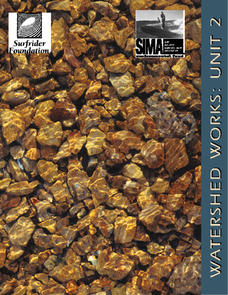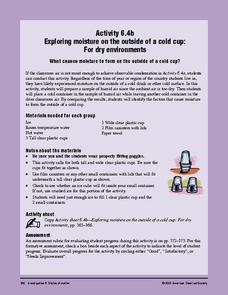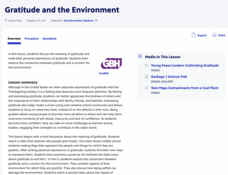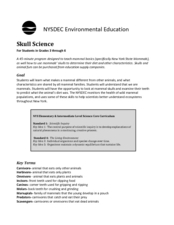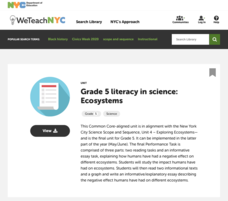Curated OER
The Influence of Human Activity on the Environment
The surge in human population in the last 2,000 years, due in large part to better health care, has brought a surge in the demand for resources and in pollution. The graphics, photographs, and real-life examples in a thought-provoking...
Texas Commission on Environmental Quality
Environmental Sciences
Whether you are teaching environmental science in junior high or studying recycling in kindergarten, there is something for all in this set of lessons designed for environmental education. The 110-page packet comes with tips for teaching...
Clean Up Australia
Why are Batteries Harmful to the Environment?
Open this lesson plan by reading together about primary and secondary batteries (such as nickel-cadmium cells), problems they can cause in the environment, and how humans can minimize the damage. Afterward, little ones examine a...
Purdue University
Food Waste and the Environment
Out of sight out of mind can be a dangerous habit. Learners investigate the life of food waste after it leaves people's homes and its impact on the environment. They complete a series of three activities that involve building a mini...
Japan Society
A Remade Environment
Art is a wonderful way to express feelings of social unrest or change. Learners will examine the works of two contemporary Japanese artists, and how they each have used art to say something big. They analyze the work of Katsuhiro Saiki...
Curated OER
Effect of Technology on the Environment
There's no doubt that one of the most consistent dangers to our environment is the risks associated with the extraction and shipment of oil. This activity focuses on oil spills - how they happen, the effects they have on the environment,...
Curated OER
Watershed Works: Unit 2
The second of a three-unit lesson plan, this focuses on how human-made structures affect watersheds. Using watershed models that were built during the first unit, junior geologists now place buildings, dams, or levees into the models and...
Berkshire Museum
Reduce, Reuse, and Recycle: Sorting Through Personal Choices
Raise children's awareness about the importance of conservation with this hands-on science instructional activity. Start by breaking the class into groups and having them collect trash from around the school or local park. Students then...
Curated OER
Humans and the Environment
This PowerPoint is a straightforward list of facts about how humans impact the environment. Subjects covered are extinction, natural resources, different types of pollution, and conservation efforts. Questions are presented on some...
Curated OER
The Environment
Young scholars explore the issues that influence our environment and research ways to decrease the negative impact that humans have on the environment. Misconceptions about environmental issues are addressed in this instructional activity.
Polar Bears International
Taking Action!
Motivate young scientists to stand up and take action with this environmental science instructional activity. To begin, the class works in small groups brainstorming actions that support the conservation of the earth before creating and...
American Chemical Society
Exploring Moisture on the Outside of a Cold Cup: For Dry Environments
If the area you live in is arid, or the preceding experiment in this unit didn't yield obvious results, use this one in place of it to help reveal where condensation comes from. The mini unit that this is part of a comprehensive...
Berkshire Museum
Where’s the Water?: Acting Out Science Cycles
Young scientists transform themselves into rivers, oceans, clouds, and drops of water in order to explore the water cycle. After assigning and explaining to students their different roles in the activity, the teacher reads aloud a...
Curated OER
Transportation and Environment
Students make an eco-friendly vehicle to help make transportation better for the environment. In this transportation lesson, students learn how transportation inventions are bad for the environment. They then see how engineers have tried...
Curated OER
Effects of Oil Spills on Environment and Marine Life
Learners explore oceanography by conducting an environmental experiment in class. In this oil spill instructional activity, students discuss the human need for oil and what is at stake when we drill for oil in our oceans. Learners read a...
PBS
Gratitude and the Environment
A class discussion begins a two-part activity about gratitude and the environment. In part one, learners watch a video then share their feelings about its most memorable moment. Delving deep into the meaning of gratitude, scholars create...
Curated OER
Skull Science
What can your class learn from a skull? With proper facilitation, they can learn about diet, physical adaptations, special differences, and even the environment. Pupils will examine a series of mammal skulls and pelts to help them...
New York City Department of Education
Grade 5 Literacy in Science: Ecosytems
How do humans affect ecosystems? Learners read two articles and interpret a graph to develop essays on the human impact on ecosystems. They read about human impact on tigers and manatees as a basis for their overarching papers.
Curated OER
Shadows & Light, Science & Puppetry
Lights, shadows, action, and inquiry await your artistic scientists. They explore the way light travels, absorbs, reflects, and transmits through shadow play. They create folktale-inspired shadow puppets, explore the science of light,...
Chicago Botanic Garden
Are You Bigfoot?
Scholars independently explore several websites to calculate their ecological footprint. Using their new found knowledge, they answer six short-answer questions and take part in a grand conversation with their peers about how our...
Chicago Botanic Garden
Faces of Climate Change
Sometimes, the best solution to a problem can be found by walking in someone else's shoes. Here, scholars use character cards to take on the roles of people around the world. They determine how their character's life affects our...
Cornell University
Field Day: Be an IPM Detective
Become a pest detective! Individually or in small groups, scholars scout the land to discover which pests—plant and animal—inhabit it, determine whether the pests are endangering the environment, and summarize their findings.
Curated OER
Food Chains: Integrating Science and Reading
Using a high interest science topic, like the food chain, can get students excited about reading, math, and more! A multitue of wonderful ideas that have cross-curricular connections.
Curated OER
Environmental Science: merit badge
In this environmental science worksheet, students use their workbook to answer short answer questions about environmental science. Students complete 6 questions total to get their merit badge.
Other popular searches
- Living Environment Science
- Environment Science Labs
- Land Use Environment Science
- Environment Science Dilemma
- Environment Science Graphing
- Environment Science Air
- Environment Science Mcuk
- Environment Science Muck
- Environment Science Vocab
- Science Environment
- Environment Science Hands On
- Science and the Environment








